
What the world has achieved in Gaza is pregnant women selling their urine, or people marching to death for a loaf of bread

This is the latest from our series on life in the ongoing Israeli genocide. These are stories of survival and resistance in the face of a violence long deranged, narrated through the extraordinary grace of the people of Palestine.
The word hunger may sound abstract to most, but in Gaza, it represents a physical and psychological assault. The body loses its balance. Nothing functions normally. So much so, the unbearable situation has forced people to evade reason. Hardship is no longer just about death, displacement, loss, inflation, or political betrayal—it is about staying alive. Pushed to the limits just to survive, people no longer adhere to the ways they once considered normal.
Since March, due to the brutal blockade imposed by Israel, Gazans have been denied even the little food they received earlier. Yet, as Israel’s genocide in Gaza continues, the bizarre multiplies, too, and Palestinians endure the most inhumane conditions imaginable. Nearly two years into Gazans being the subjects of the occupation’s barbaric military experiments, Gaza itself has become a tragic site for innovative survival. Like pregnant women selling their urine for $30 a sample.
Register of famine
The cost of living for a family of four in Gaza has shot up to $100 a day. With no jobs available, women cannot feed themselves or their children. Most economic activity is limited to aid, which is dominated by a few with capital. The rest of Gaza’s population desperately waits for food parcels, nutritional supplements and humanitarian aid. Or it simply succumbs to hunger and extreme malnutrition, which also disproportionately affects women.
Many women who suffer from weakness and emaciation due to the famine are desperately in need of nutritional supplements. But there is no food, let alone medicines. The supplements, if any, are provided by humanitarian organizations but reserved for pregnant women. Typically, any pregnant woman who wants the supplements must undergo a mid-upper arm circumference (MUAC) measurement. If the circumference is less than 230 mm, she is considered malnourished and eligible for supplements.
However, many women who obtain these supplements end up selling them for money to buy food for their children. Conversely, non-pregnant women, too, at times resort to buying samples of urine from pregnant women to prove they deserve the supplements.
Broken protocol
According to a worker with an international humanitarian organization in Gaza who requested anonymity due to restrictions on what she could officially reveal, the system used to determine who receives nutritional supplements is rigid and flawed. It depends on the MUAC for screening undernutrition, but the reality is far more complicated.
Some extremely thin women with MUAC below 230 mm don’t receive any supplements because they are not pregnant. Others, while visibly malnourished and pregnant, sometimes exceed the 230-mm threshold and are, therefore, denied aid. “We see women sitting for hours without food, waiting for their turn,” the worker said. “Some go into labor without a single meal and yet they are denied supplements, because the system doesn’t register hunger.”
The same protocol was used during the 2011 famine in Somalia, where many visibly malnourished children were denied aid because of their MUAC measurements. Many fell victim to these rigid international guidelines. During that crisis, Somali women began selling breast milk. Has Gaza become another Somalia?
It’s not a metaphor or an exaggeration. Some women in Gaza now feed their newborns wheat flour dissolved in water because their bodies can no longer produce milk. A worker with Doctors Without Borders told me some pregnant women go an entire day or two without food simply because it’s not available. Many come to hospitals to give birth and collapse on the floor from exhaustion and hunger.
Israel’s brutality is devouring the women of Gaza, subjecting them to extreme hunger and physical weakness. A pregnant woman has to care for herself and her existing children. But how can she do that without food? Isn’t it fair to say that all pregnant women in Gaza deserve nutritional supplements—without restrictions, urine tests, or humiliating measurements?
March to death
The occupation’s forced starvation of us, the people of Gaza, is an attempt to annihilate and uproot us from our land. This hunger robs us of meaning, and not just food. It is a vile attempt, worse than bombs and forced displacement, to strip us of all that is beautiful and joyful in life.
Those of us who can push, fight, or manipulate our way to a food parcel sometimes survive. Those who steal or kill for bread survive. But those who wait patiently for a fair distribution die. Hundreds of Palestinians, many of them women, have died just last month trying to get food aid. It’s far beyond a humanitarian failure and it’s happening because Israel and the United States refuse to end the genocide, or to even allow the United Nations to bring in food.
Each time Israel announces the entry of aid, only a few dozen trucks, mostly with flour and some canned goods, are let in. This does not prevent the ongoing malnutrition that has lasted months and imposed a famine. The Gaza Strip needs a sustained supply of at least 600 food trucks daily to end the famine and malnutrition. As the few trucks enter the border, they are left to be raided by looters or starving people. The aid doesn’t reach the most vulnerable. Hunger continues.
Men and women walk miles to reach distribution points, enduring humiliation and despair, just to get a food parcel or a bag of flour. It’s a pilgrimage of survival. It projects Gaza’s collapse onto the world—a people crawling toward their own destruction for a loaf of bread. This is what modern civilization has achieved: a sophisticated system to starve and humiliate people, to drive them to despair and strip them of all dignity—forcing them to sell urine, bodies, or organs for a meal.
The world may refuse to believe this is happening to people just like them. It may desperately want to believe Palestinians are a different species. It’s a moral stain of historical proportions. But our records, our images, our stories will endure. The truth will not be erased; it will not turn to dust. And no matter how thick the fog of war, no matter how many hands shift or share the blame, Gaza will remember.





